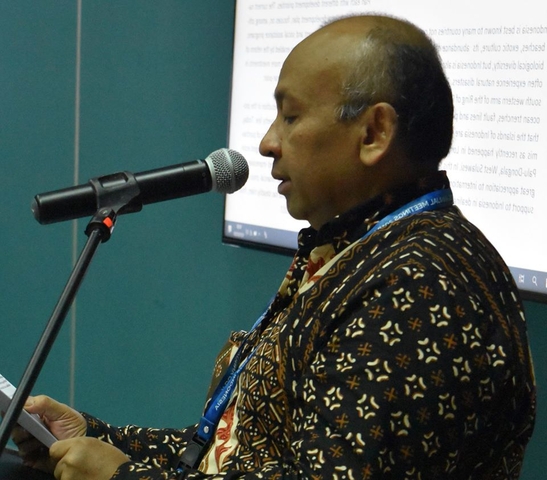
Special social support needed to support vulnerable children even during rapid economic growth.
Well targeted and resourced social programmes are needed and effective for achieving Early Childhood Development (ECD) targets even in an environment of sustained economic growth. This was the key message from Hon. Agus Gumiwang Kartasasmita, Minister for Social Affairs, Republic of Indonesia, at the just ended high level forum on faith and early childhood development.
The event whose theme was “Results for Children: Faith Actors High Level Advocacy Forum in Investing in Early Childhood Development,” was co-organized by Arigatou International and the Moral Imperative to End Extreme Poverty. This was a high level advocacy forum for faith actors working to eradicate childhood adversity. The one day event took place on the sidelines of the Annual Meetings of the World Bank and IMF in Bali Indonesia.
In the key note speech, delivered on his behalf by Mr. Edi Suharto, Director General for Social Rehabilitation, the Minister spoke of the importance of investing in Early Childhood Development as part of the goals to reduce poverty, achieve high quality of human development and sustainable development.
Indonesia, he said, “believes strongly in having healthy, educated and happy children” and as such Indonesia takes seriously the challenge of investing in early childhood development.
Indonesia, he asserted, has a very ambitious and focused ECD programme supported by conditional cash transfers (CCT) implemented by Ministry of Social Affairs. In turn these efforts are important for poverty alleviation, the achievement of high quality of Human Development Index (HDI) and Sustainable Development Goals (SDGs).
To achieve these targets, Indonesia has historically deployed a strategy of rapid sustained economic growth and targeted social programmes. This has necessitated highly targeted social expenditures in form of social assistance programmes. The social programmes comprise a combination of cash and non-cash assistance, such as free rice, for those living in extreme poverty.
This combination of high sustained economic growth and targeted expenditures has helped to push down poverty rates. As a result, Indonesia has cut poverty rates from 23.4% in 1999 to 9.8 in 2018, the lowest in the country’s history.
During the period that this strategy has been in place, Indonesia has risen to become the 10th largest economy in terms of purchasing power parity and the largest in South East Asia with a GDP per capita of US$3,847, up from US$857 in 2000.
The minister highlighted an initiative, the Family Hope Assistance (Programme Keluarga Harapan) (PKH) as a case in point. PKH aims to improve the welfare of families living in extreme poverty through Conditional Cash Transfer. The programme provides money for specified health and education expenses every three months to families with pregnant women or where children are vulnerable to poverty. By 2018 PKF was offering assistance to 10 million families.
Evidence shows that PKF is helping improve academic performance for children from participating families by enabling them attend and stay in school.


